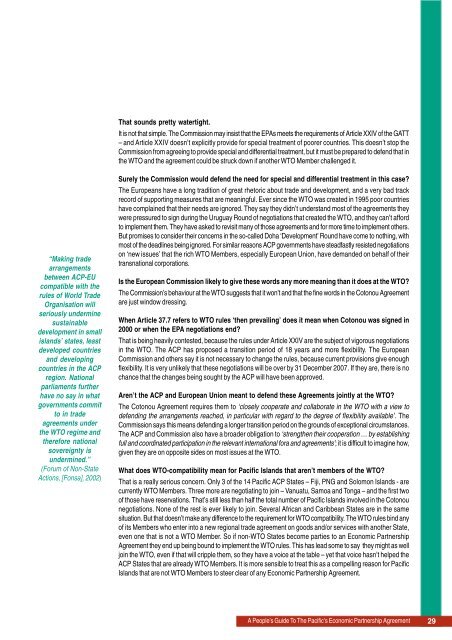REPA Booklet - Stop Epa
REPA Booklet - Stop Epa
REPA Booklet - Stop Epa
Create successful ePaper yourself
Turn your PDF publications into a flip-book with our unique Google optimized e-Paper software.
That sounds pretty watertight.<br />
It is not that simple. The Commission may insist that the EPAs meets the requirements of Article XXIV of the GATT<br />
– and Article XXIV doesn’t explicitly provide for special treatment of poorer countries. This doesn’t stop the<br />
Commission from agreeing to provide special and differential treatment, but it must be prepared to defend that in<br />
the WTO and the agreement could be struck down if another WTO Member challenged it.<br />
“Making trade<br />
arrangements<br />
between ACP-EU<br />
compatible with the<br />
rules of World Trade<br />
Organisation will<br />
seriously undermine<br />
sustainable<br />
development in small<br />
islands’ states, least<br />
developed countries<br />
and developing<br />
countries in the ACP<br />
region. National<br />
parliaments further<br />
have no say in what<br />
governments commit<br />
to in trade<br />
agreements under<br />
the WTO regime and<br />
therefore national<br />
sovereignty is<br />
undermined.”<br />
(Forum of Non-State<br />
Actions, [Fonsa], 2002)<br />
Surely the Commission would defend the need for special and differential treatment in this case?<br />
The Europeans have a long tradition of great rhetoric about trade and development, and a very bad track<br />
record of supporting measures that are meaningful. Ever since the WTO was created in 1995 poor countries<br />
have complained that their needs are ignored. They say they didn’t understand most of the agreements they<br />
were pressured to sign during the Uruguay Round of negotiations that created the WTO, and they can’t afford<br />
to implement them. They have asked to revisit many of those agreements and for more time to implement others.<br />
But promises to consider their concerns in the so-called Doha ‘Development’ Round have come to nothing, with<br />
most of the deadlines being ignored. For similar reasons ACP governments have steadfastly resisted negotiations<br />
on ‘new issues’ that the rich WTO Members, especially European Union, have demanded on behalf of their<br />
transnational corporations.<br />
Is the European Commission likely to give these words any more meaning than it does at the WTO?<br />
The Commission’s behaviour at the WTO suggests that it won’t and that the fine words in the Cotonou Agreement<br />
are just window dressing.<br />
When Article 37.7 refers to WTO rules ‘then prevailing’ does it mean when Cotonou was signed in<br />
2000 or when the EPA negotiations end?<br />
That is being heavily contested, because the rules under Article XXIV are the subject of vigorous negotiations<br />
in the WTO. The ACP has proposed a transition period of 18 years and more flexibility. The European<br />
Commission and others say it is not necessary to change the rules, because current provisions give enough<br />
flexibility. It is very unlikely that these negotiations will be over by 31 December 2007. If they are, there is no<br />
chance that the changes being sought by the ACP will have been approved.<br />
Aren’t the ACP and European Union meant to defend these Agreements jointly at the WTO?<br />
The Cotonou Agreement requires them to ‘closely cooperate and collaborate in the WTO with a view to<br />
defending the arrangements reached, in particular with regard to the degree of flexibility available’. The<br />
Commission says this means defending a longer transition period on the grounds of exceptional circumstances.<br />
The ACP and Commission also have a broader obligation to ‘strengthen their cooperation … by establishing<br />
full and coordinated participation in the relevant international fora and agreements’; it is difficult to imagine how,<br />
given they are on opposite sides on most issues at the WTO.<br />
What does WTO-compatibility mean for Pacific Islands that aren’t members of the WTO?<br />
That is a really serious concern. Only 3 of the 14 Pacific ACP States – Fiji, PNG and Solomon Islands - are<br />
currently WTO Members. Three more are negotiating to join – Vanuatu, Samoa and Tonga – and the first two<br />
of those have reservations. That’s still less than half the total number of Pacific Islands involved in the Cotonou<br />
negotiations. None of the rest is ever likely to join. Several African and Caribbean States are in the same<br />
situation. But that doesn’t make any difference to the requirement for WTO compatibility. The WTO rules bind any<br />
of its Members who enter into a new regional trade agreement on goods and/or services with another State,<br />
even one that is not a WTO Member. So if non-WTO States become parties to an Economic Partnership<br />
Agreement they end up being bound to implement the WTO rules. This has lead some to say they might as well<br />
join the WTO, even if that will cripple them, so they have a voice at the table – yet that voice hasn’t helped the<br />
ACP States that are already WTO Members. It is more sensible to treat this as a compelling reason for Pacific<br />
Islands that are not WTO Members to steer clear of any Economic Partnership Agreement.<br />
A People’s Guide To The Pacific’s Economic Partnership Agreement 29
















